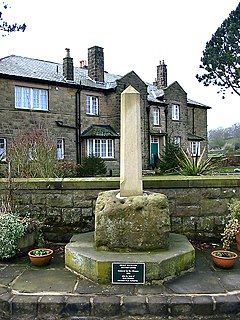Great Hucklow
| Great Hucklow | |
|---|---|
 Great Hucklow Butter Cross | |
| OS grid reference | SK177777 |
| District | |
| Shire county | |
| Region | |
| Country | England |
| Sovereign state | United Kingdom |
| Post town | BUXTON |
| Postcode district | SK17 |
| Dialling code | 01298 |
| Police | Derbyshire |
| Fire | Derbyshire |
| Ambulance | East Midlands |
| UK Parliament | |
Great Hucklow is a small village in the Derbyshire Peak District which nestles under Hucklow Edge between the villages of Tideswell and Bradwell. It has a population of about 100. The area is now mainly agricultural, but the village was formerly a centre of the Derbyshire lead mining industry. The lead vein or rake outcrops to the surface to the west of the village and dives under the rocks of Hucklow Edge on the western side of the village where an adict, known as Milldam Mine, has recently been reopened by Glebe Mines Ltd that connects the various deep mines that had formerly been dug along the edge. This mine is being worked for fluorspar, which is frequently found associated with lead in the vein.
In the village, there is a thriving primary school, which is located up a short lane (School Lane), right under the edge, and a pub, the Queen Anne.
It had a theatre for 40 years, which was run by Dr L. du Garde Peach and the actors and staff were from the local area. The first production (The Merchant of Venice, Shakespeare) was in 1927 staged in the Hucklow Holiday Homes. The first set of plays in the New Play House was in 1938, with four one act plays written by Dr Peach. The New Play House was in a converted lead mining building (known locally as cupolas from the lead smelting furnace). The first 200 second hand seats cost 1 shilling and 9 pence each (less than 9p each!). The stage was 28 feet (8.5 m) wide by 30 feet (9.1 m) deep. For many years the theatre brought many visitors to Great Hucklow from all parts of the north of England. The theatre building is still heavily used as an activity centre.
The Unitarian Old Chapel was founded in 1696 and is still very much in use; it also has a small meeting room which is well used by the community. The Methodist Chapel, built in the early part of the 19th century, was converted to offices in 1999.
The [Nightingale Centre], which belongs to the Unitarians, is in the middle of the village and accommodates groups for school and community visits to the area, conferences and provides country holidays for children from inner cities. The Centre brings many visitors to the village from all over the world.
The village is twinned with Parisot, Tarn-et-Garonne which is a rural village of similar size in the south west of France.
The land rises steeply to the north of the village to Hucklow Edge and at Camphill on the plateau above it there is a popular gliding field, which in 1954 hosted the World Gliding Championships.
The village is accessed from the B6049 about a mile north of where it crosses the A623 at the Anchor Inn. The road to the village goes off to the east at the Windmill triangle.
The village is host to an annual martial arts residency; this is a tradition stretching back almost 30 years. The Tetsudo students can often be found enjoying the delights of inns and hostelries in Foolow, Tideswell and Eyam early in August.
References
[Origin of the name Great Hucklow]
